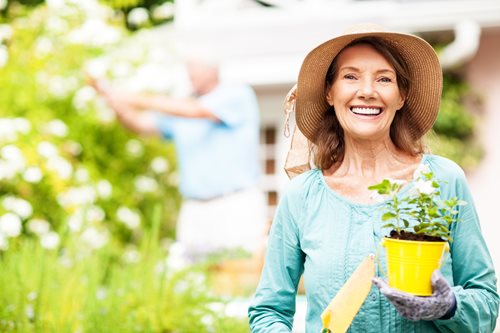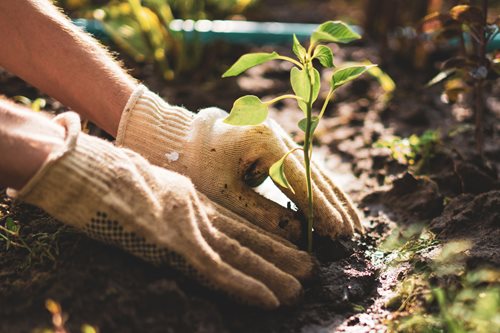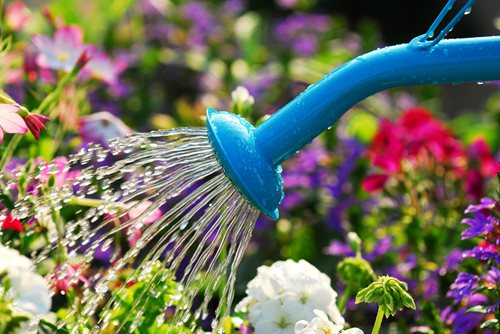
With the Victoria Day long weekend behind us now, spring is in the air! This year, spring and summer will feel very different for many of us. What might have been a great time to gather with friends and family for a Barbeque or perhaps a cottage weekend is probably going to be missed as we continue to respect social distancing.
That said, there are plenty of activities we can still enjoy this spring, and one of them is gardening. These days, finding a safe way to be outdoors is a treasure. Gardening allows us an opportunity to enjoy fresh air while maintaining a safe distance from others. It’s also a great way to enjoy some light physical activity, occupy our minds and produce something beautiful -- and maybe even edible!
While gardening might seem as simple as putting plants in soil and giving them water, there are a lot of nuances that can make the difference between a struggling patch and a gorgeous garden. Here’s 5 tips to consider for your gardening this spring:
1. Carefully Choose Your Location
Location is probably the most important thing to plan for when starting a garden. Of course, there’s the sun to consider (do your plants get consistent light throughout the day? Is there adequate shade for plants that need it?) But there are other concerns too, like how visible your garden is.
If you’re planting flowers, it’s great to have a garden that’s nice and visible so you can enjoy it and even share it with others. Even with vegetables though, visibility is a good idea. Gardens require quite a bit of maintenance, so keeping it in sight will keep you inspired to weed and water regularly.
Another reason you need to consider location is proximity to a water source. It’s never fun to drag a long garden hose around, and in fact that can pose a tripping hazard. Lugging a full watering can long distances is equally inadvisable, so it’s important you consider a location with an accessible outdoor tap.
2.Get Specific With Your Soil
Unless you’re extremely lucky, it’s almost certain you’ll need to augment the natural soil of your garden with nutrient rich topsoil, compost, manure, or a combination (called TripleMix). Getting good soil means supplying your plants with the right nutrients, allowing good drainage, and providing a steady foundation on which to grow.
Good soil is rich in organic material and well aerated (so not too tightly packed). Top soil is often a great choice for new gardens as it contains lots of organic material and is generally more aerated than the soil you’d be augmenting with it. However, for established gardens, adding top soil annually isn’t really necessary. Instead, compost can offer a bigger organic boost and is often less expensive.
Some plants, like roses, flourish best in extremely specific conditions. If you’re looking to elevate your gardening game, you can actually research the preferred acidity of your flowers, and purchase specialty soil which is tailored with a specific pH balance for that specific plant.
3.Prepare for Pests
From slugs to aphids, long-time gardeners are wise to be wary of pests. Even just a few slugs can wreak havoc on a recently planted vegetable garden and ruin hours of hard work. Luckily, for the crafty gardener there are a few steps you can take to protect your plants.
The best thing to prepare for pests is to prevent them from ever being a problem. One solution to this is called “intercropping” which is especially useful for vegetable gardens. In essence, pests need to become comfortable before they fully establish a colony, destroying a plant. This means revisiting it many times. Intercropping is the process of mixing up vegetables you plant with flowers and different kinds of vegetables, to prevent pests from memorizing the route to their potential colony and becoming confused.
Sometimes, pests are just inevitable. That’s why it’s always best to encourage a few insect allies to join your team. By planting herbs and flowers that appeal to the predators that eat pests, you can have your own police force patrolling your garden and keeping your plants safe. Consider planting dill, lacewood and sunflowers to attract these helpful bugs.
4.Water Your Plants Correctly
It might seem obvious to water your plants regularly, but there’s actually some art to it that will help your garden flourish.
 First, it’s important to remember that not all plants require the same amount of water. Hearty plants like succulents can actually drown if you water them casually. Vegetables like tomatoes and cucumbers have a very high tolerance for water and can be watered more than once a day.
First, it’s important to remember that not all plants require the same amount of water. Hearty plants like succulents can actually drown if you water them casually. Vegetables like tomatoes and cucumbers have a very high tolerance for water and can be watered more than once a day.
Another trick when it comes to watering is remembering to get as close as possible to the root when you're giving your plants a drink. No water is absorbed through the leaves, so spraying them down from the top means much of that water will be lost to evaporation. Worse, keeping too much of your plants moist can encourage harmful molds and diseases. Take care to water properly and your plants will thank you for it.
5.Give Your Plants Ample Room
Right now, we’re all keeping our distance from one another to protect our health. When planting your garden, you can adopt the same mentality -- plants do best when they have ample space between them.
A crowded garden means a few things: One, it’s much shadier and denser in the foliage. This promotes moisture that doesn't evaporate, which in turn encourages disease, mold and even pests. Speaking of pests, if they do attack one of your plants, giving enough space might prevent them from colonizing its neighbour.
There are practical reasons too. For flowers, showing the dark, well-kept soil is an attractive look. It also makes weeding and tending to your garden easier. For vegetable gardens, leaving room makes it much easier to harvest your veggies as they come in and will prevent you from accidentally missing picking that perfectly ripe tomato.
With the Victoria Day long weekend over now and the threat of frost minimized, now is a perfect time to start planning how you can spend your time safely. Gardening is a great solution and a wonderful activity as the weather warms up, and with these tips you’ll be set up for success.
We’d love to hear about your garden. Tell us what what is your favourtie flowers or favourtie vegetable to grow? Please share your stories with us on our Facebook page. And don’t forget to “Like” and “Follow” us!


